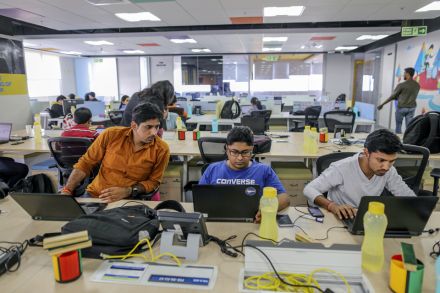The Modi government had launched two programmes named Startup India (August 2015) and Standup India (April 2016) to encourage entrepreneurship among young populous of the country. There are three pillars of Startup India Simplification and Hand-holding, Funding Support and Incentives, Industry-Academia Partnership and Incubation. The government launched Pradhan Mantri Mudra Yojana to give low-interest loans to entrepreneurs from underprivileged background. The scheme is expected to increase innovation, productivity and create a huge number of jobs.
According to the latest data from the Department of Industrial Policy and Promotion (DPIIT), the scheme has created more than 5 lakh jobs so far. “Start-ups create valuable jobs. 187,004 jobs have been reported by 16,105 Department for Promotion of Industry and Internal Trade (DPIIT)-recognised start-ups, i.e., more than 11 direct jobs per start-up. With each direct job leading to 3x indirect jobs, the total jobs created by these start-ups are estimated at more than 560,000,” said Ramesh Abhishek, DPIIT secretary.
https://twitter.com/rabhishek1982/status/1135763271242223616
The Modi government set up 10,000 crore rupees fund under mall Industries Development Bank of India (Sidbi) to cater financial needs of the startups. SIDBI has distributed 2,570 crore rupees to venture funds so far. “From the fund of funds, Sidbi has committed Rs 2,570 crore to 45 venture funds, catalysing investments of more than Rs 25,000 crore. 244 start-ups have received funding of Rs 1,561 crore,” tweeted Abhishek.
The scheme has been able to encourage the entrepreneurship among the youth of the country. The Digital India initiative spurred the startups in technology sector and 18,861 startups have been recognized so far. “In May 2019, 814 start-ups have received recognition. This is more than one start-up every hour. These entities are spread across 513 districts of 29 states and six Union Territories,” said Abhishek.
The Modi government is also working towards setting up a mechanism called SETU (Self-utilization and Talent Utilization) to provide technical assistance and incubation to startups. Apart from this, it is planning to ease out the existing regulatory regime for startups and to extend tax incentives to them.
Entrepreneurs of the country have suffered for a long time due to License Raj. The unnecessary bureaucratic interference at every step of business development became counter-productive for the Indian economy. However, the short socialist regime could not alter the entrepreneurial energy embedded in Indian culture for thousands of years. As the government liberalized economy given the balance of payments crisis, the economy came on track and the country is witnessing near double-digit growth for the last two decades. The number of startups are growing exponentially every year. According to the fourth edition of the NASSCOM-Zinnov report titled “Indian Start-up Ecosystem 2018”, the country added more than 1200 new startups in 2018, 20 percent more than 1000 startups last year.
The BJP 2019 general election manifesto put great emphasis on encouraging startups. To encourage the startups, the BJP promised collateral free credit up to 50 lakh rupees to entrepreneurs. “We will launch a new scheme to provide collateral-free credit up to 50 lakh for entrepreneurs. We will guarantee 50% of the loan amount for female entrepreneurs and 25% of the loan amount for male entrepreneurs,” read the manifesto. The party also promised to establish a seed startup fund with the amount of 20,000 crore rupees. “We will continue to promote and encourage Staups through creation of a ‘Seed Staup Fund’ of 20,000 crore,” reads the manifesto. The next five years of the Modi government are expected to ‘golden days’ for startups.
